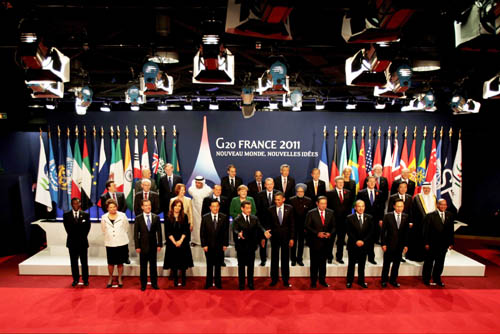 |
|
G20 LEADERS: Leaders of the Group of 20 economies at the Cannes summit on November 3 (CFP) |
Three years after the outbreak of the global financial crisis in 2008, problems such as the European sovereign debt crisis have remained the sword hanging over the international economic system's head.
Leaders of the Group of 20 (G20) economies discussed these pressing issues at their sixth summit in Cannes, France, from November 3 to 4, agreeing to join hands to pass through the current crisis. China also promised to make greater contributions to the world economy while maintaining its own growth.
Summit achievements
After discussions, G20 leaders issued a communiqué on boosting economic recovery, promoting reform in international monetary and financial systems and improving global economic governance.
The summit also adopted the Cannes Action Plan for Growth and Jobs. The plan identified each country's policies and actions to promote economic growth, including short-term measures aimed at ensuring growth and promoting stability, as well as mid- and long-term plans for carrying out structural reforms, expanding employment, and consolidating the basis of economic growth. This shows the determination of the G20 to jointly promote the strong, sustainable and balanced growth of the world economy.
At the summit, leaders promised to push forward free trade and oppose trade protectionism. The Financial Stability Board announced the list of 29 "global systemically important financial institutions," including the Bank of America, the Bank of China and Deutsche Bank.
Based on an agreement reached at a meeting of G20 finance ministers and central bank governors in October, these institutions will be required to increase their capital ratio to prevent a banking crisis.
Ma Zhaoxu, spokesman of the Chinese delegation, listed four major achievements of the Cannes summit: First, the summit focused discussions on the European sovereign debt problems. G20 leaders decided to ensure the IMF has sufficient resources to help member countries overcome their difficulties, and specific measures are to be worked out by G20 finance ministers.
Second, the summit stressed the global economy has entered a difficult period, so the G20 needs to further strengthen macroeconomic policy coordination, jointly support economic recovery and restore market confidence.
Third, the summit discussed other issues including the reform of international monetary and financial systems, volatility of commodity prices and international trade and reached an important consensus.
Fourth, emerging market countries actively participated in discussions and consultations at the summit, and played an important and constructive role.
| 